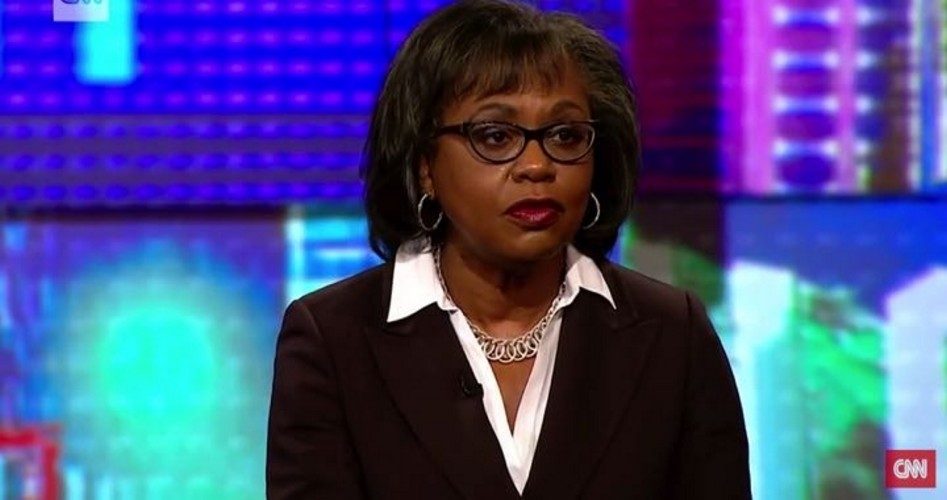
“It’s not just the monsters. It’s people we otherwise admire, people we give awards to, people we vote into office and people who sometimes many of us mourn the loss of when they’re held accountable. This is a moment where we are going to deal with all of those things.”
Thus Anita Hill told a group of professionals in the motion picture industry in Beverly Hills, California, on Friday. Hill and Fatima Goss Graves, president of the National Women’s Law Center, told the group of Hollywood figures that the momentum of the Harvey Weinstein sexual misconduct revelations can result in lasting social change.
Hill was thrust into the national spotlight in 1991 when she made charges of sexual harassment against Clarence Thomas in a last-minute effort to derail his confirmation to the U.S. Supreme Court. With the recent revelations of allegations of sexual misconduct, ranging from sexual harassment to actual sexual assault making the news, Hill said that the “huge moment” needs to have a lasting impact. “In many ways,” she added, “it’s unprecedented, but it needs sustained energy.”
Today, Hill is a professor of women’s studies at Brandeis University in Waltham, Massachusetts. She expressed pride in her role in drawing attention to the issue of sexual harassment, pointing to the “surge of complaints that were filed after 1991, and as importantly, the stories people started to tell their friends and their loved ones about their own experiences, whereas a generation of us came into the workplace never having heard those stories.… So, I’m not entirely surprised that we got to this moment. I am impressed by the velocity of it.”
The recent surge in allegations now includes liberal icons such as newsman Matt Lauer and Senator Al Franken (D-Minn.), which led Hill to comment that it included people “we otherwise admire.” When asked recently whether she believed Republicans should ask Associate Supreme Court Justice Clarence Thomas to resign, like Franken, as the Washington Post called for just last week, Hill responded, “I see a kind of resistance even acknowledging that this is a significant detriment to leadership in this country. And that’s why I focus on the fact of not just what would Clarence Thomas do, but what are the leaders going to do in response to evidence of misconduct? How are they going to lead on this issue?”
She added, “I think the leadership on both sides of the aisle needs to step up today and show women in the world that equality does matter.”
Despite Hill’s nonpartisan-sounding words, the fact is that she was handed that mantle of “leadership” on this issue by the national media after her sensational charges against Thomas in 1991. But when she had the opportunity to actually lead on this very issue, she punted.
While the Left rallied to Hill, arguing that a woman should always be believed in any charge of sexual harassment, regardless of the lack of evidence supporting such an allegation, they radically changed their stance with the Clinton scandals of 1998, only seven years later. Betty Friedan dismissed President Bush as Public Enemy No. 1 for his support of Thomas over Hill, but defended President Bill Clinton over three women who charged him with either sexual harassment (Paula Jones); sexual assault (Kathleen Willey), and even rape (Juanita Broaddrick). In a classic example of double-standard hypocrisy, the National Organization for Women fought against Thomas, but strongly defended Clinton.
The 26 senators who had voted against the confirmation of Clarence Thomas and were still in office in 1998, voted to keep Clinton in office. Every single one.
And what about Anita Hill herself, the new “champion” of women against sexual harassment? Even if Thomas had said everything that Hill accused him of saying, his actions were nowhere near those of Clinton. (Thomas has vehemently denied all of Hill’s accusations since 1991.)
In an article in Newsweek, Hill protested that the situations of Clinton and Thomas “are quite different.” In an appearance on Meet the Press, Hill actually supported the defense of Clinton by feminist leaders, the same ones who had attacked the reputation of Thomas. “We live in a political world, and the reality is that there are larger issues other than just individual behavior,” Hill explained.
The main difference in the Thomas and Clinton cases appears to be that sexual harassment allegations should be believed when made against a conservative such as Thomas, and disbelieved when made against a liberal hero such as Clinton. At least that was Hill’s standard when she flipped on the allegations against a president who was on the Left, such as herself.
“I was torn,” Hill wrote in her book Speaking Truth to Power, “because Ms. Jones was aligned with people who were Bill Clinton’s political enemies,” admitting that “Paula Jones’ claim that Bill Clinton sexually harassed her tests our commitments to this issue.”
Hill wrote in her book, “Each case must be examined on its own, with motivation and credibility taken into full account.”
Perhaps Hill and the other left-wing feminists need to look in the mirror and question their own motivation and credibility on this issue.
Image: Screenshot of a CNN interview with Anita Hill, posted to YouTube



